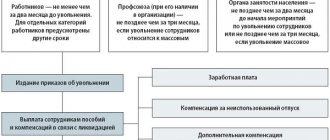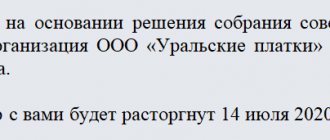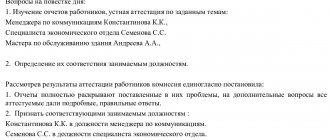The rights of a legal entity include the possibility of opening a separate division, which may not always be profitable from an economic point of view. Dismissal due to the liquidation of a branch is a fairly common practice. This is due to the fact that the turnover of the enterprise may decrease, which leads to a decrease in the need for a large staff of employees. When closing a branch, the manager must strictly follow all the standards provided for by current legislation so as not to be brought to administrative liability.
TWO VIEWS ON THE PROBLEM
First point of view. In the event of liquidation of a separate structural unit located in another area, the dismissal of employees must occur on the grounds provided for in clause 1, part 1, art. 81 of the Labor Code of the Russian Federation, in compliance with the rules established by law in relation to dismissal in cases of liquidation of the organization as a whole. The argument for this statement is the provision of Part 4 of Art. 81 of the Labor Code of the Russian Federation, according to which the termination of employment contracts with employees of this unit is carried out according to the rules provided for cases of liquidation of an organization.
Considering that in the situation under consideration, the rules specific to the liquidation of an organization are subject to application, it is necessary not only to provide dismissed employees with the guarantees provided for cases of termination of the employment contract in connection with the liquidation of the organization, but also to indicate the basis for the dismissal of the employee, which entails the occurrence of rights to appropriate guarantees, i.e. the basis provided for in clause 1, part 1, art. 81 Labor Code of the Russian Federation.
Second point of view. The basis for termination of an employment contract in the event of liquidation of a separate structural unit may be a reduction in the organization's workforce, despite the presence of additional guarantees established by law for cases of abolition (liquidation) of structural units located in another location. The argument in this case is the argument that the presence of statutory deviations from the procedure established for general cases of termination of an employment contract due to staff reduction is not a reason for changing the grounds for termination of an employment contract.
Applying the norms of labor legislation in cases of liquidation of a structural unit located in another locality, employers, employees and courts of general jurisdiction interpret differently the norms of the Labor Code of the Russian Federation, which determine the features of termination of an employment contract with employees carrying out labor activities in the abolished separate structural units.
The unequal application of the above norms caused their contradictory interpretation by courts of general jurisdiction during the consideration and resolution of individual labor disputes, which was the result of contradictory judicial practice.
Dismissal of maternity leavers and other benefit employees
As you know, some employees who belong to the preferential category cannot simply be fired. However, this rule does not apply if a division of the enterprise is liquidated. Dismissal of women who are on maternity leave can also be carried out if the education ceases its activities.
In addition, exempt employees include:
- women who are on maternity leave;
- employees who are on official leave during this period;
- women who have not yet gone on maternity leave, but are already in an interesting situation;
- employees who are on sick leave at the time of liquidation;
- women who are raising small children under 3 years of age.
It is worth noting that all of the listed citizens can also be dismissed unilaterally. However, department management is required to notify them, as is all other staff. Moreover, they can all count on compensation payments and offers about available vacancies.
HOW ARE DISPUTES RESOLVED IN PRACTICE?
An analysis of modern judicial practice suggests that courts, when considering specific cases, do not attach much importance to the basis chosen by the employer for terminating an employment contract in the event of the liquidation of a separate division of the organization located in another locality, focusing on other points.
For example, according to the Judicial Collegium for Civil Cases of the Pskov Regional Court, when considering a labor dispute, the definition of a liquidated structural unit located in another area from the position of its isolation has legal significance. Depending on whether it is separate or cannot be classified in this category, the recognition of the termination of the employment contract as legal or illegal depended.
Attention Controversial decision
Thus, K., a 3rd category operator at gas station-62 of the Velikolukskaya Oil Depot branch of Pskovnefteprodukt LLC, was dismissed by order dated December 28, 2009 No. 0309K-348 in connection with the liquidation of a structural unit under clause 1 of part 1 of Art. 81 Labor Code of the Russian Federation. Considering her dismissal illegal, K. filed a lawsuit to reinstate her at work, pointing out, among other violations committed, in her opinion, by the employer, that the structural unit located in another area is not such, and this does not allow applying rules for terminating an employment contract provided for in Part 4 of Art. 81 Labor Code of the Russian Federation.
By the decision of the court of first instance, the plaintiff was denied reinstatement at work, since the abolished structural unit, located in another area (the village of Maksimovo, Shelkovsky volost, Velikoluksky district, Pskov region), was recognized as separate.
This conclusion of the court was based on the fact that gas station-62 was registered with the tax office, which is confirmed by the registration certificate, according to which the structural unit is located in another area, its property is the property of Pskovnefteprodukt LLC. In addition, the court took into account the inventory lists of fixed assets, work schedules and the training log of AZS-62.
The Judicial Collegium for Civil Cases of the Pskov Regional Court did not agree with this conclusion, arguing as follows.?
Since the Labor Code of the Russian Federation does not contain the concept of a separate structural unit, the court considers it necessary to be guided by the provisions of Art. 55 of the Civil Code of the Russian Federation, which contains characteristics common to branches and representative offices of a legal entity, which include the following:
- both represent the interests of the legal entity and protect them;
- both are endowed with the property of the legal entity that created them and act on the basis of the provisions approved by it;
- both have managers appointed by the legal entity and acting on the basis of its power of attorney;
- both are subject to indication in the constituent documents of the legal entity that created them.
The cassation court found the following.
1. The Charter of Pskovnefteprodukt LLC does not provide for such a separate structural unit as AZS-62.
2. According to the Company’s certificate submitted to the cassation court, there is no Regulation on AZS-62.
3. At AZS-62 there is no manager appointed by a legal entity and acting on the basis of his power of attorney. This circumstance is confirmed by local acts of the director of the Velikolukskaya Neftebaza branch, designated in the Charter of Pskovnefteprodukt LLC, who issued orders for appointment to the position, concluded employment contracts (including with the plaintiff), and approved the working hours of AZS-62.
4. According to the defendant’s staffing schedule, AZS-62 is assigned to the Velikolukskaya Oil Depot, a branch of Pskovnefteprodukt LLC. This circumstance is confirmed by the order of LLC Sales Association “Pskovnefteprodukt” dated October 27, 2009 No. 206, paragraph 2 of which ordered the director of the Velikolukskaya Oil Depot branch to submit an action plan to terminate the activities of the facilities, which included gas station-62.
5. The regulations on the branch of Pskovnefteprodukt LLC - Velikolukskaya Neftebaza - include the functions of transporting petroleum products to gas stations as its main activities; refueling vehicles from public gas stations and selling oils and lubricants in small packages at gas stations; carrying out, in accordance with the Rules for the operation of existing oil and gas facilities, gas stations their repair and reconstruction.
Taking into account the functions of Pskovnefteprodukt LLC and the functions of its branch Velikolukskaya Neftebaza, we can conclude that interests outside the location of the legal entity were carried out by the branch as a separate structural unit of Pskovnefteprodukt LLC.
6. According to clause 2.9 of the Branch Regulations, the relationship of the branch with other separate structural divisions of the Company is based on a contractual basis.
The court's reference to the fact that AZS-62 is registered for tax purposes has no legal significance for resolving the dispute, since the purpose of registering a separate structural unit with the tax authority is tax control, and not defining the structural unit of the organization as separate.
Based on the above, the conclusion of the trial court on the legality of K.’s dismissal on the grounds provided for in paragraph 1 of part 1 of Art. 81 of the Labor Code of the Russian Federation, does not correspond to the legally significant circumstances of the case and the requirements of the law. For this reason, the court decision was declared subject to cancellation.
Without dwelling in detail on the controversial nature of the above conclusion of the court of general jurisdiction, it should be noted that another basis for recognizing dismissal in connection with the liquidation of a separate structural unit located in another locality as legal was the presence of not one, but two or more separate structural units of the organization in one locality different from the location of the organization (legal entity). This allows (does not prevent) the employer from fulfilling the requirements of the law aimed at ensuring the employee’s right to work with a given employer, in the form of securing the employer’s obligation to employ an employee whose place of work has been abolished (liquidated, reduced).
Thus, G., assistant director of the Moscow territorial administration of JSC GSK Yugoria, by order dated March 22, 2010, was dismissed in connection with the liquidation of the organization on the grounds provided for in clause 1, part 1, art. 81 Labor Code of the Russian Federation. Not agreeing with the dismissal, she filed a lawsuit to reinstate her at work.
By decision of the Tverskoy District Court of Moscow dated July 1, 2010, her request for reinstatement was denied.
The argument for this court decision was the following.
Firstly, the court proceeded from the fact that the place of legal registration of the defendant is the Khanty-Mansiysk Okrug of Yugra, Khanty-Mansiysk, while the location of the structural unit in which the plaintiff worked is Moscow.
The basis for the dismissal of the plaintiff under clause 1, part 1, art. 81 of the Labor Code of the Russian Federation was served by the order dated December 29, 2009 of OJSC GSK Yugoria “On the liquidation of the Moscow territorial administration of OJSC GSK Yugoria and the transfer of affairs,” according to which the Moscow territorial administration of OJSC GSK Yugoria was subject to liquidation from 01.04.2010.
Since the reason for the decision to dismiss the plaintiff was the decision to liquidate a structural unit located in another area, the court of first instance came to the conclusion that the dismissal of the plaintiff under clause 1, part 1 of Art. 81 of the Labor Code of the Russian Federation in connection with the liquidation of a structural unit located in another area is legal.
Secondly, the court concluded that there were no violations in the actions of the defendant. According to the court of first instance, the established procedure for the dismissal of the plaintiff in connection with the liquidation of the enterprise, provided for by labor legislation, was not violated.
The plaintiff’s statements that she was not offered vacant positions, she was not transferred to another job, were not to be taken into account, since the offer of vacant positions, transfer to another position is not the responsibility of the defendant upon liquidation of the organization according to the current labor legislation.
In the opinion of the court, the plaintiff’s reference to the fact that after the liquidation of the Moscow territorial administration of JSC GSK “Yugoria” as a legal entity did not cease to operate, several other divisions continue to function, is also not a legal basis for satisfying the claim for reinstatement at work.
The Judicial Collegium for Civil Cases of the Moscow City Court, disagreeing with the indicated conclusions of the court, overturned the decision of the court of first instance regarding the refusal to satisfy the request for reinstatement at work. The basis for this decision was the following circumstances, which, in the opinion of the Judicial Panel, had legal significance for the case.
1. The cassation court proceeded, first of all, from the constitutional and legal meaning formulated by the Constitutional Court of the Russian Federation in the ruling of April 21, 2005 No. 144-O “On the refusal to accept for consideration the complaint of citizen Svetlana Vasilievna Permyakova about the violation of her constitutional rights by part four of Article 81 of the Labor Code of the Russian Federation."
The Constitutional Court of the Russian Federation, analyzing the meaning of the norm provided for in Part 4 of Art. 81 of the Labor Code of the Russian Federation, indicated the following.
Termination of an employment contract according to the rules provided for cases of liquidation of an organization is legal and justified, if the liquidation of a separate structural unit of the organization located in another locality is associated with the actual termination of the organization’s activities in that locality. This makes it impossible to transfer workers with their consent to another job in the same organization within the same area.
Consequently, among the circumstances of legal significance for this case, it is necessary to include those that confirm or refute the actual termination of the organization’s activities in Moscow, as well as the impossibility of transferring the plaintiff to another job with her consent in the same organization within the same same area.
2. In the cassation appeal and during the trial in the court of first instance, G. indicated that State Insurance OJSC did not cease its activities in Moscow. At the time of consideration of the case by the Judicial Collegium, several structural divisions of State Insurance OJSC were operating in Moscow, where she could have worked.
In violation of the requirements of Part 2 of Art. 12, part 2 art. 57 of the Code of Civil Procedure of the Russian Federation, the court of first instance did not check this circumstance; it did not clarify the question of the availability of employment opportunities for G. in the division of State Insurance OJSC in Moscow during the period of dismissal.
In such circumstances, the court decision regarding the refusal to satisfy the request for reinstatement at work is subject to cancellation and remand for a new trial in the same court for the following reasons.
In the situation under consideration, the court of first instance incorrectly determined and did not establish all the circumstances relevant to the case. In addition, violations established by the cassation instance of the court, committed by the court of first instance, cannot be corrected by the court of cassation, taking into account the need for additional clarification of the circumstances relevant to the case, with due respect for the procedural rights of the persons participating in the case.
DISMISSAL ON THE GROUND PROVIDED IN P. 1, PART 1, ART. 81 Labor Code of the Russian Federation
Employers, terminating an employment contract with an employee under clause 1, part 1, art. 81 of the Labor Code of the Russian Federation, in the event of liquidation of a structural unit located in another locality, we proceed from the fact that the basis of the employment contract must be inextricably linked with the procedure for terminating the employment contract. At the same time, the provision of guarantees to the employee must correspond to the grounds on which he was dismissed from work.
Based on this position, the dismissal of employees is carried out on the basis provided for in paragraph 1 of Part 1 of Art. 81 of the Labor Code of the Russian Federation, - in connection with the liquidation of the organization. Courts of general jurisdiction recognize the dismissal of employees on this basis as legal and justified for the following reasons.
Attention Controversial decision
So, E.D., E.A., B., S. turned to the limited liability company "Mitsui Automotive CIS Investment B.V." with a statement declaring the dismissal illegal on the grounds provided for in paragraph 1 of Part 1 of Art. 81 Labor Code of the Russian Federation.
The reason for this statement was the lack of liquidation, which indicates the absence of a legal basis provided for by this rule, and allows us to assert that dismissal on this basis is illegal.
Meanwhile, the decision of the Presnensky District Court of Moscow rejected the claims. By the ruling of the Judicial Collegium for Civil Cases of the Moscow City Court, the above decision was left unchanged.
When considering the case, the court found that, in accordance with the concluded employment contracts, the plaintiffs were hired by the Moscow branch of the limited liability company Mitsui Automotive CIS Investment B.V.
By orders dated November 13, 2009, E.D., E.A., B., S. were dismissed under clause 1, part 1, art. 81 of the Labor Code of the Russian Federation in connection with the liquidation of the organization.
The basis for the dismissal of employees was the Company’s decision dated September 11, 2009 to liquidate the branch in Moscow.
By virtue of clause 7.3 of the Regulations on the branch of the Limited Liability Company "Mitsui Automotive CIS Investment B.V." its activities are terminated, including by decision of the Company’s board of directors to liquidate the branch.
According to the order dated September 11, 2009, based on the decision of the Company, the activities of the branch were suspended and the procedure for its liquidation began.
The fact of liquidation of the Company's branch in Moscow was confirmed by written evidence:
- information presented to the court by the State Registration Chamber under the Ministry of Justice of Russia, according to which information about the closure of a company branch was entered into the database of the state register of branches of foreign legal entities accredited on the territory of the Russian Federation;
- information letter of the Interdistrict Inspectorate of the Federal Tax Service No. 47 for Moscow dated May 11, 2010, from which it follows that the Company was deregistered at the location of the branch due to the termination of activities in the Russian Federation;
- by the decision of the director of branch No. 6 of the GU-MROFSS of the Russian Federation dated May 27, 2009;
- a certificate of deregistration of the insured organization with the Pension Fund of Russia.
When making its decision, the court was guided by the provisions of Part 4 of Art. 81 of the Labor Code of the Russian Federation and Part 8 of Art. 63 Civil Code of the Russian Federation.
According to Part 8 of Art. 63 of the Civil Code of the Russian Federation, the liquidation of a legal entity is considered completed, and the legal entity is considered to have ceased to exist after making an entry to this effect in the Unified State Register of Legal Entities.
The documents presented by the defendant, listed above, were found by the court to be sufficient to recognize the dismissal of employees under paragraph 1 of part 1 of Art. 81 of the Labor Code of the Russian Federation in connection with the liquidation of the organization is justified.
The plaintiffs' arguments that their dismissal was carried out in violation of the law, since the defendant continues to carry out his activities, the court rejected as contrary to the law and the provisions of Part 4 of Art. 81 Labor Code of the Russian Federation.
At the same time, the court noted that the continuation of the organization’s activities as a whole does not exclude the possibility of dismissal of employees under clause 1 of part 1 of Art. 81 of the Labor Code of the Russian Federation in connection with the termination of the activities of a branch of the organization.
The fact that the Moscow branch of the company was liquidated was reliably established by the court and confirmed by the case materials.
The plaintiffs’ reference to the fact that it was not the liquidation of the organization that occurred, but a reorganization by transferring jurisdiction to an affiliated legal entity that is part of the group, by creating the corresponding department in the affiliated Mitsui & Co. Moscow LLC, the court did not take into account.
The fact that some branch employees went to work for Mitsui & Co. Moscow LLC does not in itself confirm the fact of the reorganization.
Under such circumstances, the court concluded that there were no grounds for satisfying the claims to declare the dismissal illegal.
Sample order for liquidation
When drawing up an order to terminate the activities of an entity, it is necessary to refer to the document on the basis of which the liquidation takes place. In case of forced termination of activity, this is a court decision, and in case of voluntary termination:
- minutes of the founders' meeting;
- Act.
The order must indicate the following information:
- full name of the head office;
- name of the unit;
- date of the order and its number;
- title (what the document is about);
- essence (liquidation);
- the main reason for which the education is closed and dismissal occurs upon liquidation of the unit of the entire staff;
- deadlines for completing liquidation;
- members of the commission who will monitor the process;
- their positions;
- signatures.
DISMISSAL ON THE GROUND PROVIDED FOR P. 2 PART 1 ART. 81 Labor Code of the Russian Federation
The application of this basis to the above cases is much less common.
When choosing this basis for dismissal, employers, as a rule, are guided by the provisions of clauses 1 and 4 of Art. taken together. 81 Labor Code of the Russian Federation.
The norm provided for in clause 1, part 1, art. 81 of the Labor Code of the Russian Federation, the liquidation of a separate structural unit located in another area is not considered a case that gives grounds for the dismissal of an employee. The norm provided for in Part 4 of Art. 81 of the Labor Code of the Russian Federation, does not contain grounds for applying clause 1, part 1, art. 81 of the Labor Code of the Russian Federation to cases of liquidation of a separate structural unit located in another area.
It is known that the abolition of a structural unit of an organization is mainly associated with a decrease in the number of employees, since the abolition (exclusion from the structure of the organization) of a structural unit is associated with the exclusion of staffing units assigned to this structure from the staffing table. Taking this into account, employers choose the basis for terminating an employment contract with employees who worked in a liquidated (abolished) structural unit, including a separate one located in another area, in the form of staff reduction (Clause 2, Part 1, Article 81 of the Labor Code of the Russian Federation).
Important aspects of the concept of terrain
It is not always the case that a clause about the place of work is included in the employment contract, and this is mandatory in a situation with structures located separately from the parent company. The specific department in which the person will carry out activities must also be indicated here. Compliance with these requirements would simplify the situation for all parties to the employment relationship in a situation where it is terminated.
This aspect is also important for obtaining certainty in potential conflict situations:
- Changes to the terms of the contract, transfer within this framework to another job are possible only by agreement of the parties, with the exception of some exceptions determined by the norms of the Labor Code.
- An employee can be transferred to another job only with his written consent. Transfer to the same separate unit in the same area and for similar work is acceptable (for example, from one store to another).
- The employee must be offered all positions for which he is responsible. But if an organization actually ceases operations in a particular territory, these proposals cannot be implemented in practice.
- In other areas, the employer is obliged to offer work only if this is specifically stated in the agreement with the employee or the collective agreement. Such offers should be made more than once, but throughout the entire period before dismissal.
- In the event that the division is not located in the area where the head office is located, dismissals should occur as during the liquidation of a legal entity. If in the same way - due to a reduction in numbers or staff.
There is also such subtlety. The so-called other locality is just a territory outside the administrative boundaries of a particular city or region. If the organization has divisions in neighboring locations, then, in theory, no special problems should arise. In practice, it is not profitable for business owners to drag their entire staff with them from one place to another.










